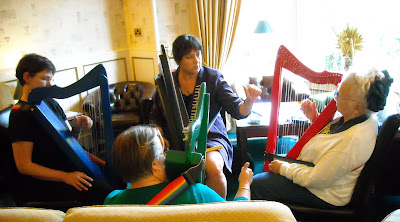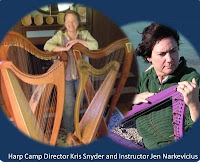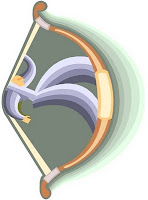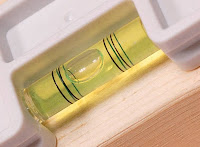Many of us play the harp (or any instrument for that matter) for the pleasure it brings us, the joy we can share, and for the relaxation it affords us, especially in tense times.
And because so many of us play for fun, we often play only in fits and starts, sitting down for the two minutes we’re waiting for the microwave to beep or the few moments between putting the last load into the washer but before the previous load finishes in the drier. They are stolen moments.
And unfortunately, because they are stolen moments, we are sloppy with them – we plop on the bench, grab the harp, and blast through whatever piece of music comes to mind. We don’t prepare, we don’t breathe,and we don’t assure our posture is good, our backs straight, our heads up, lengthened through the spine, relaxed but composed. We’re too busy trying to bang through the tune! We don’t have time for all that posture stuff.
Well, we need to make time for that. Improper sitting, poor posture, slumped spines, feet not on the floor, craned necks, tense hands contribute to two potential outcomes – one hurts us in the short term (“gink” your back because you sat twisted?) and the other hurts us in the long term (if you always practice that way, you will have practiced yourself into a habit which you will have to work hard to reverse). And we don’t want practicing or playing to hurt our backs or to become a pain in the neck (or lower!).
And when it comes to posture, you must be vigilant. You don’t want to lose the bubble on how you sit, either at the harp or at your desk, the dinner table, or while schlumped on your couch watching television. Be mindful of your posture and know how much core strength you actually possess (or should that be corps strength?).
Many of us, especially those that are no longer adolescents, have much less core strength than we think we do. It will help your playing if you strengthen that core by getting some exercise. Strengthening your core helps you protect your back from everyday chores including lifting, twisting, and bending. It will also help you sit better and for longer when you play. Look at those harp players you admire – they have phenomenal posture. Why? First, they have practiced it, and second, they spend so much time on that bench that they must have the posture needed to maintain sitting and playing for so long.
You don’t have to become a pilates instructor or an exercise fanatic to achieve these gains. Just work some of the basic abdominal exercises we have all learned over the years into your day. You will feel better, be able to hold yourself up to play longer, and have better posture while you are playing (even if you plop down to play). You will be being kind to your back as well. What’s not to lose – the crunch is on.*
*All material provided within this blog is for informational and educational purposes only, and in no way is any of the content on this website to be construed as medical advice or instruction. No action should be taken solely on the contents of this blog. This is not medical advice, nor is it meant to replace the advice of your medical care provider. Exercise at your own risk, learn appropriate exercise technique from a professional, and use good judgement when exercising.







